

Re-Identification Risks and Myths, Superusers and Super Stories (Part I: Risks and Myths) Are ISPs about to betray our trust? A text transcription follows.
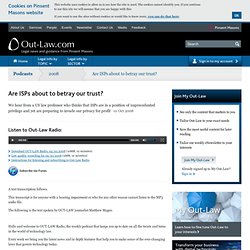
This transcript is for anyone with a hearing impairment or who for any other reason cannot listen to the MP3 audio file. The following is the text spoken by OUT-LAW journalist Matthew Magee. Hello and welcome to OUT-LAW Radio, the weekly podcast that keeps you up to date on all the twists and turns in the world of technology law. Every week we bring you the latest news and in depth features that help you to make sense of the ever-changing laws that govern technology today. My name is Matthew Magee, and this week we talk to a professor who says that creeping interference with our personal data by internet service providers poses the biggest threat to our privacy we have ever faced. But first, the news:- Phone frauds will be denied premium numbers And Norway steps up iTunes action Anyone who has abused premium-rate telephone numbers in the past will be barred from using the numbers again, telecoms regulator Ofcom has said.
Privacy laws will guarantee net neutrality, says legal expert. A debate has raged in the US over net neutrality, the principle that all internet traffic should be treated equally.
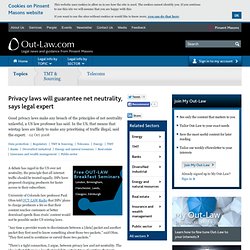
ISPs have proposed charging producers for faster access to their subscribers. University of Colorado law professor Paul Ohm told OUT-LAW Radio that ISPs' plans to charge producers a fee so that their content reaches customers at better download speeds than rivals' content would not be possible under US wiretap laws. "Any time a provider wants to discriminate between a [data] packet and another packet they first need to know something about those two packets," said Ohm. "They first need to scrutinise or surveil those two packets. " "There's a tight connection, I argue, between privacy law and net neutrality. Ed Whiteacre, chief executive of US telecoms giant AT&T, ignited the debate in 2005 when he talked of the high cost of building and maintaining the kind of fast networks that consumers demanded as use of video, live gaming and other bandwidth-hungry applications grew.
HS22final. Santa Clara Law Digital Commons - High Tech Law Institute Events: What the Surprising Failure of Data Anonymization Means for Law and Policy. Privacy by design: a framework for design in the age of big data. ‘How does Big Data affect personal privacy?’
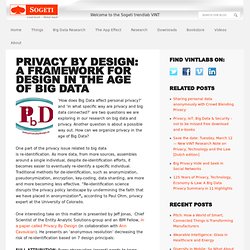
And ‘in what specific way are privacy and big data connected?’ Are two questions we are exploring in our research on big data and privacy. Another question is about a possible way out. How can we organize privacy in the age of Big Data? One part of the privacy issue related to big data is re-identification. One interesting take on this matter is presented by Jeff Jonas, Chief Scientist of the Entity Analytic Solutions-group and an IBM Fellow, in a paper called Privacy By Design (in collaboration with Ann Cavoukian). FULL ATTRIBUTION: Every observation (record) needs to know from where it came and when.
DATA TETHERING: Adds, changes and deletes occurring in systems of record must be accounted for, in real time, in sub-seconds. Santa Clara Law: Paul Ohm Event. What the Surprising Failure of Data Anonymization Means for Law and Policy Wednesday, April 7, 2010 6:00 – 7:15 pm panel discussion 7:15 – 8:00 pm reception Nobili Hall Paul Ohm, Associate Professor of Law University of Colorado Law School with commentary by Cynthia Dwork, Distinguished Scientist, Microsoft Chad Raphael, Associate Professor of Communication, Santa Clara University.
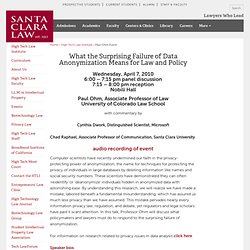
Data Anonymization and Re-identification Lecture Featuring Paul Ohm, SCU, April 7. Paul Ohm: Homepage. Paul Ohm: Anonymization Has Failed. I recently had the privilege of attending a talk where Paul Ohm presented the main ideas behind his latest research paper.
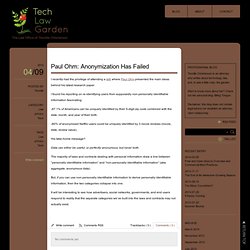
I found his reporting on re-identifying users from supposedly non-personally identifiable information fascinating: -87.1% of Americans can be uniquely identified by their 5-digit zip code combined with the date, month, and year of their birth. -80% of anonymized Netflix users could be uniquely identified by 3 movie reviews (movie, date, review value). His take-home message? Data can either be useful, or perfectly anonymous, but never both. Paul Ohm presentation - Privacy and Data Anonymization.
How to Muddy Your Tracks on the Internet. There are no secrets online.
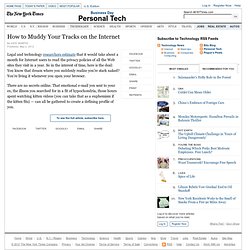
That emotional e-mail you sent to your ex, the illness you searched for in a fit of hypochondria, those hours spent watching kitten videos (you can take that as a euphemism if the kitten fits) — can all be gathered to create a defining profile of you. Your information can then be stored, analyzed, indexed and sold as a commodity to data brokers who in turn might sell it to advertisers, employers, health insurers or . The Case for Facebook. Let's not let 10 days of share price fluctuation blind us to Facebook's unprecedented accomplishments.
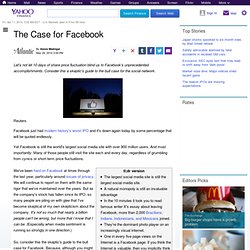
Consider this a skeptic's guide to the bull case for the social network. Reuters Facebook just had modern history's worst IPO and it's down again today by some percentage that will be quoted endlessly. Yet Facebook is still the world's largest social media site with over 900 million users. Database anonymity at risk, warns researcher [printer-friendly] People might be more identifiable than previously thought from supposedly anonymised information contained in large databases, according to a technology law expert.
![Database anonymity at risk, warns researcher [printer-friendly]](http://cdn.pearltrees.com/s/pic/th/database-anonymity-researcher-37536123)
[mp3] Paul Ohm on OUT-LAW Radio on Database anonymity - Delicious/pascalvanhecke/tolisten+system:filetype:mp3. Database anonymity at risk, warns researcher. Increasing amounts of personal information are collected by organisations and stored in massive databases.
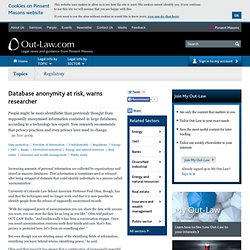
That information is sometimes used or released after being stripped of elements that could identify individuals in a process called 'anonymisation'. University of Colorado Law School Associate Professor Paul Ohm, though, has said that the techniques used no longer work and that it is now possible to identify people from the release of supposedly anonymised records. "With the supposed power of anonymisation you can share the data with anyone you want, you can store the data for as long as you like," Ohm told podcast OUT-LAW Radio.
"And traditionally it has been a conversation stopper. Once you assert anonymisation everyone nods their heads and says 'that's fine, privacy is protected here, let's focus on something else'. " But even though you are deleting many of the identifying fields of information, everything you leave behind retains identifying power," he said.